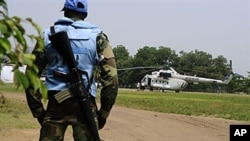The United Nations says it needs more troops in Ivory Coast to resolve a political crisis between the internationally-recognized winner of the country's presidential election and the incumbent leader who refuses to yield power.
The head of United Nations peacekeeping says he will ask the Security Council for as many as 2,000 additional troops for Ivory Coast. And Alain Le Roy says he hopes those soldiers will arrive here in the next few weeks.
The current force of nearly 10,000 troops is deployed throughout the country, including parts of the north that are still controlled by former rebels who back Alassane Ouattara.
U.N. peacekeepers are also guarding a resort hotel in Abidjan that Mr. Ouattara has not left since Ivory Coast's electoral commission declared him the winner of November's election. Incumbent president Laurent Gbagbo says he is the winner because the constitutional council annulled as fraudulent nearly ten percent of all ballots cast.
The Economic Community of West African States, the African Union, the European Union and the United States say Mr. Ouattara is the duly-elected president and Mr. Gbagbo must step down.
Mr. Gbagbo wants the entire U.N. peacekeeping force to leave Ivory Coast because he says it no longer has the confidence of the people.
U.N. peacekeepers would be compelled to leave a country at the head of state's request, as they did this past year in Chad. But the United Nations no longer recognizes Mr. Gbabgo's authority and has seated in New York a new Ivorian ambassador named by Mr. Ouattara.
Following talks with West African heads of state in Abidjan this week, Mr. Gbagbo agreed to negotiate a peaceful end to the crisis without preconditions. But the regional alliance says that does not remove its threat to use force to drive him from power.
James Gbeho is the president of the ECOWAS alliance. He says regional leaders understand the difficulties in mounting such a force but will not hesitate to do so if the crisis can not be resolved peacefully. "We, of course, are aware of the dangers in the force option particularly in a country like Cote d'Ivoire where almost all citizens and ethnic groups of our ECOWAS region are represented. And so it is an option that must be used with a lot of circumspection. But if push comes to shove, that is what is going to be used," he said.
Mr. Ouattara says regional military intervention would not lead to a large-scale conflict because the operation would only need to remove one person, Mr. Gbagbo.
UN Peacekeepers Want More Troops for Ivory Coast




